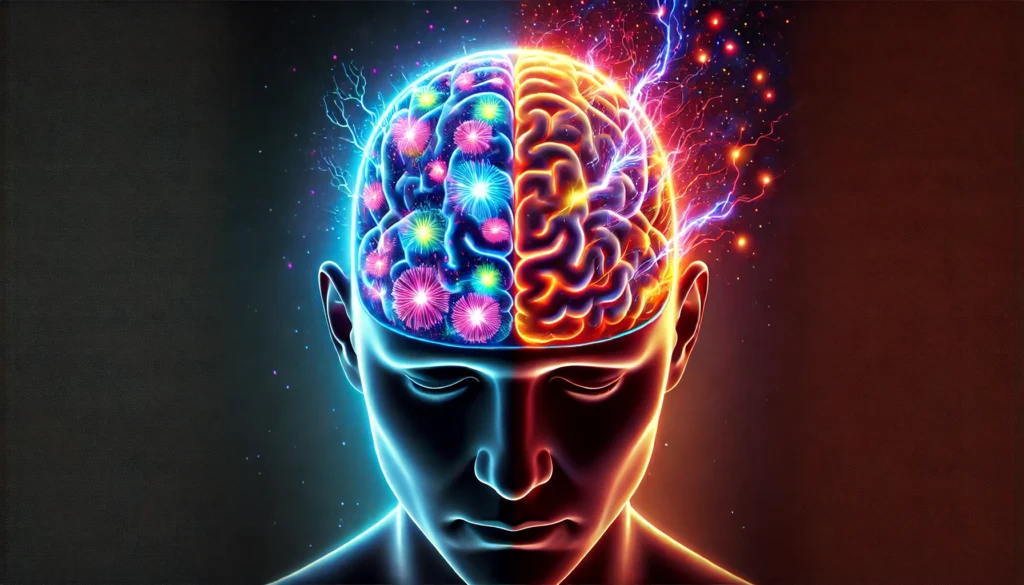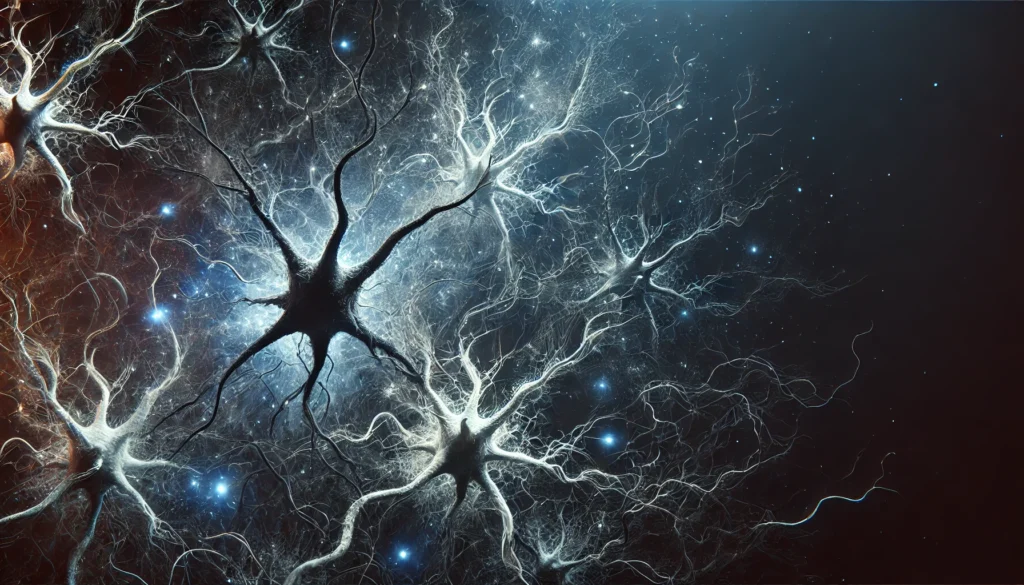Introduction
Sleep is an essential biological process that underpins nearly every aspect of human health, particularly brain function. The importance of sleep for cognitive performance, memory consolidation, and overall neurological well-being has been extensively studied. However, in today’s fast-paced world, sleep deprivation has become a widespread issue, leading to significant consequences for brain function. Understanding the effects on the brain from lack of sleep is critical for recognizing the cognitive and neurological risks associated with chronic sleep loss.
You may also like: What Vitamin Deficiency Causes Brain Fog? Key Nutrients You Might Be Missing
Scientific research on sleep deprivation has been shown to reveal a wide range of cognitive impairments, including decreased memory retention, slower processing speed, reduced problem-solving ability, and increased susceptibility to mood disorders. The science on lack of sleep indicates that even short-term sleep deprivation affects brain function by impairing the prefrontal cortex, which is responsible for higher-order thinking, decision-making, and emotional regulation. Long-term consequences are even more severe, with emerging studies suggesting that prolonged sleep deprivation and brain damage are closely linked, potentially increasing the risk of neurodegenerative diseases such as Alzheimer’s and Parkinson’s disease.
This article explores the mechanisms by which sleep deprivation affects the brain, the specific cognitive impairments associated with insufficient rest, and potential solutions to mitigate these risks. By delving into the latest scientific findings, we will provide a comprehensive understanding of how sleep and brain function are inextricably linked.

The Neurobiology of Sleep: Why the Brain Needs Rest
Sleep is a highly complex physiological process that allows the brain to undergo essential restorative functions. The sleep cycle consists of two primary phases: rapid eye movement (REM) sleep and non-rapid eye movement (NREM) sleep, both of which play distinct yet equally important roles in cognitive health.
During NREM sleep, the brain clears metabolic waste products that accumulate throughout the day, including beta-amyloid, a protein linked to Alzheimer’s disease. This clearance occurs through the glymphatic system, which becomes highly active during deep sleep. Research on how sleep affects the brain has demonstrated that without sufficient deep sleep, the accumulation of toxic substances may contribute to cognitive decline over time.
REM sleep, on the other hand, is essential for memory consolidation and emotional processing. It is during this stage that the brain strengthens neural connections, processes complex emotions, and integrates newly acquired knowledge into long-term memory. A sleep-deprived brain vs. normal brain comparison reveals stark differences in these processes, with sleep-deprived individuals exhibiting poorer memory recall and heightened emotional reactivity.
Understanding how sleep deprivation and brain function are connected necessitates an exploration of neurotransmitters and hormones. Melatonin, the sleep-regulating hormone, is disrupted by inconsistent sleep patterns, reducing the body’s ability to enter deep sleep phases. Additionally, prolonged wakefulness increases cortisol levels, the stress hormone, which further impairs cognitive function and heightens anxiety.
Cognitive Impairments from Sleep Deprivation
One of the most immediate effects of sleep deprivation on brain function is cognitive impairment. Research investigating what does lack of sleep do to your brain has consistently shown deficits in executive functioning, working memory, and decision-making. These cognitive impairments arise due to disruptions in neural activity within the prefrontal cortex, an area responsible for rational thought and problem-solving.
The effects on the brain from lack of sleep extend beyond simple forgetfulness or slowed thinking. Studies on sleep deprivation effects on brain function suggest that chronic sleep loss leads to significant reductions in synaptic plasticity—the brain’s ability to form and reorganize synaptic connections. This impairment is particularly concerning for students, professionals, and individuals who rely on cognitive agility for their daily tasks.
In a sleep-deprived brain, emotional regulation is also compromised. The amygdala, the brain’s emotional processing center, becomes hyperactive in response to sleep deprivation, leading to increased irritability, heightened stress responses, and reduced ability to cope with everyday challenges. This explains why sleep deprivation has been shown to contribute to the development of anxiety and depression, as the brain struggles to maintain emotional equilibrium.
Additionally, attention deficits are among the most well-documented sleep deprivation effects on the brain. Research has found that individuals who suffer from chronic sleep deprivation display diminished attention span, increased distractibility, and reduced ability to sustain focus on tasks. This is particularly concerning in fields that demand sustained concentration, such as medicine, law, and academia.
Sleep Deprivation and Long-Term Brain Damage
While short-term cognitive impairments from lack of sleep are concerning, long-term consequences can be even more severe. Studies on sleep deprivation and brain damage suggest that chronic sleep deprivation contributes to structural and functional changes in the brain that may be irreversible.
One of the most alarming findings in sleep research is the association between chronic sleep deprivation and neurodegenerative diseases. Scientific inquiry into how does sleep deprivation affect the brain has revealed that persistent sleep loss accelerates brain aging, leading to increased risk of Alzheimer’s disease and other forms of dementia. This is largely due to the accumulation of beta-amyloid plaques, which are less efficiently cleared in a sleep-deprived brain.
Furthermore, research on insomnia in the brain indicates that prolonged sleep deprivation disrupts myelin production—the protective coating around nerve fibers. This deterioration impairs communication between neurons, leading to decreased cognitive function and an increased likelihood of developing neurological disorders.
Another consequence of sleep deprivation and brain function deterioration is reduced neurogenesis, or the formation of new neurons. The hippocampus, a brain region crucial for memory and learning, is particularly vulnerable to sleep loss. Chronic sleep deprivation inhibits the production of new neurons, leading to memory deficits and cognitive decline.
Mitigating the Effects of Sleep Deprivation
Given the extensive research on how does lack of sleep affect the brain, it is crucial to implement strategies to mitigate its adverse effects. One of the most effective ways to counteract sleep deprivation is through sleep hygiene practices, which include maintaining a consistent sleep schedule, creating a restful environment, and avoiding stimulants such as caffeine and electronic screens before bedtime.
Incorporating nootropic supplements and cognitive enhancers has also been explored as a means to improve sleep and thinking. Certain supplements, such as magnesium, L-theanine, and melatonin, have been shown to promote relaxation and enhance sleep quality, thereby supporting overall brain function.
For individuals suffering from chronic insomnia, cognitive behavioral therapy for insomnia (CBT-I) has proven to be an effective intervention. By addressing maladaptive thought patterns and behaviors that contribute to sleep disturbances, CBT-I helps individuals restore healthy sleep patterns and minimize cognitive impairment from sleep loss.
Additionally, engaging in regular physical exercise and mindfulness meditation has been shown to enhance sleep quality and counteract the negative effects of sleep deprivation on brain function. Exercise promotes the release of endorphins and reduces cortisol levels, thereby facilitating better sleep, while meditation enhances relaxation and improves sleep efficiency.

Frequently Asked Questions (FAQ) on Sleep Deprivation and Brain Function
1. How does sleep deprivation affect the brain’s ability to process information? Sleep deprivation has been shown to significantly impair cognitive processing, reducing the brain’s efficiency in handling complex tasks. When the brain gets no sleep, neural pathways that support learning and memory consolidation weaken, leading to difficulties in problem-solving and decision-making. A sleep-deprived brain vs. a normal brain also shows increased activity in the amygdala, making emotional responses more intense and less rational. The science on lack of sleep indicates that even a single night of poor rest can disrupt attention, making tasks that require focus more error-prone. Over time, chronic sleep deprivation can rewire the brain’s ability to adapt and learn, making long-term cognitive decline more likely.
2. What does sleep deprivation do to the brain’s neurotransmitters? The effects on the brain from lack of sleep extend to neurotransmitter regulation, altering dopamine, serotonin, and glutamate levels. Sleep deprivation and brain function are closely linked because these chemicals play a key role in mood regulation, cognitive function, and alertness. A lack of sleep on the brain disrupts the balance of excitatory and inhibitory neurotransmitters, leading to hyperactivity in some brain regions and sluggishness in others. This imbalance can contribute to irritability, anxiety, and even symptoms resembling depression. The long-term impact of disrupted neurotransmitter function due to sleep deprivation has been linked to an increased risk of neurodegenerative diseases.
3. How does insomnia affect the brain differently from occasional sleep loss? While a single night of poor sleep can impair focus and memory, chronic insomnia in the brain has more profound consequences. Insomnia affects the brain by creating persistent neural inflammation, which can lead to a higher risk of mood disorders and cognitive decline. Unlike short-term sleep deprivation, which temporarily reduces brain function, long-term insomnia alters the brain’s structure, particularly in the prefrontal cortex, where decision-making and impulse control occur. Studies on sleep deprivation effects on brain function suggest that untreated insomnia can also weaken the blood-brain barrier, increasing susceptibility to toxins and infections. Over time, these changes can lead to neurodegeneration and a higher risk of conditions like Alzheimer’s disease.
4. Can the brain recover from prolonged sleep deprivation? Recovery from chronic sleep deprivation is possible but depends on the severity and duration of the sleep deficit. The sleep-deprived brain vs. normal brain shows that neuroplasticity allows for partial recovery of lost cognitive abilities when proper sleep is restored. However, persistent sleep deprivation and brain damage may occur if the lack of rest is extreme and prolonged. Studies on how sleep affects the brain indicate that while short-term sleep deficits can be reversed with a few nights of quality sleep, long-term deprivation may leave lasting damage to memory and emotional regulation. Prioritizing consistent, high-quality sleep can help restore many cognitive functions, but some impairments may require longer recovery periods.
5. What are the early signs of cognitive decline due to sleep deprivation? Early indicators of sleep deprivation effects on the brain include forgetfulness, reduced attention span, and difficulty processing information. Individuals may also experience mood swings, heightened emotional sensitivity, and an inability to handle stress effectively. The science on lack of sleep also links chronic deprivation to slower reaction times and increased impulsivity, both of which are signs of declining executive function. A lack of sleep on the brain can also manifest in decreased motivation and increased reliance on stimulants like caffeine to stay alert. Recognizing these symptoms early and improving sleep quality can prevent long-term cognitive damage.
6. How does sleep deprivation impact emotional regulation? One of the most noticeable sleep deprivation effects on brain function is its impact on emotional stability. The sleep-deprived brain shows hyperactivity in the amygdala, the part of the brain responsible for processing emotions, leading to exaggerated responses to stress and negative stimuli. Simultaneously, the prefrontal cortex, which helps regulate emotions, becomes less active, making it harder to control impulsive reactions. This imbalance can result in mood swings, irritability, and difficulty managing interpersonal relationships. Research on how sleep affects the brain also suggests that chronic deprivation can increase the risk of anxiety and depression.
7. How does sleep affect memory consolidation and learning? Sleep and brain function are deeply connected, particularly in the process of memory consolidation. During deep sleep stages, the brain strengthens neural connections, transferring short-term memories to long-term storage. A lack of sleep on the brain disrupts this process, leading to fragmented memory retention and difficulty recalling information. The science on lack of sleep shows that REM sleep, which is crucial for problem-solving and creative thinking, is particularly affected when sleep is cut short. Students and professionals who experience sleep deprivation often find it harder to retain new information, making learning less efficient.
8. What does lack of sleep do to your brain’s ability to detoxify? One of the lesser-known sleep deprivation effects on the brain is its impact on the glymphatic system, which clears toxins and metabolic waste. How sleep affects the brain in this regard is crucial—deep sleep allows cerebrospinal fluid to flush out harmful substances, including beta-amyloid proteins linked to Alzheimer’s disease. When sleep is consistently disrupted, the brain no longer efficiently removes these toxins, increasing the risk of neurodegeneration. The accumulation of these harmful substances due to sleep deprivation has been shown to contribute to cognitive decline and brain fog. Prioritizing sleep hygiene can help support the brain’s natural detoxification process.
9. Are some people more resistant to the effects of sleep deprivation than others? Genetics play a role in how sleep deprivation affects the brain, with some individuals naturally requiring less sleep to function optimally. However, even those who seem resilient to sleep loss still experience underlying cognitive impairment. The sleep-deprived brain vs. normal brain shows that while some people may not feel the immediate effects, their reaction times, decision-making abilities, and long-term health still suffer. Studies on sleep deprivation and brain function have also found that chronic short sleepers have a higher risk of cardiovascular disease and metabolic disorders. While some may appear less affected, no one is truly immune to the negative effects of sleep deprivation.
10. How can sleep deprivation lead to long-term brain damage? Chronic sleep deprivation and brain damage are closely linked due to prolonged neural inflammation, oxidative stress, and impaired neurogenesis. Studies on what sleep deprivation does to the brain suggest that persistent lack of sleep may accelerate brain aging, leading to conditions like dementia. Sleep deprivation effects on the brain also include a reduction in gray matter volume, particularly in areas responsible for memory and emotional control. How does insomnia work in the brain? It disrupts the circadian rhythm, leading to hormonal imbalances that can worsen brain function over time. Ensuring adequate sleep can help preserve cognitive health and reduce the risk of long-term damage.

Conclusion
The scientific consensus on how sleep deprivation affects the brain is clear: insufficient sleep has profound cognitive and neurological consequences. From impairments in memory and decision-making to increased risk of neurodegenerative diseases, the sleep-deprived brain operates at a significant disadvantage. Understanding the connection between sleep and brain function is crucial for adopting healthier sleep habits and mitigating long-term risks.
The research on what does sleep deprivation do to the brain highlights the urgency of prioritizing sleep as an essential component of overall health. Implementing sleep hygiene practices, considering cognitive-enhancing supplements, and addressing underlying sleep disorders can significantly improve cognitive performance and emotional well-being. As scientific advancements continue to reveal the complexities of sleep and thinking, it becomes increasingly evident that quality rest is not a luxury but a necessity for optimal brain health.
sleep and cognitive health, effects of poor sleep, chronic sleep deprivation risks, brain fog and sleep loss, neurodegeneration and sleep, cognitive decline prevention, sleep hygiene for brain health, REM sleep importance, deep sleep benefits, mental clarity and sleep, sleep disorders and cognition, insomnia and memory loss, stress and sleep deprivation, brain recovery during sleep, sleep cycle disruptions, sleep deprivation research, brain inflammation from lack of sleep, sleep quality and mental performance, sleep deprivation solutions, improving sleep for better focus
Further Reading:
The consequences of sleep deprivation on cognitive performance
How Lack of Sleep Impacts Cognitive Performance and Focus
Effects of sleep deprivation on cognition
.Important Note: The information contained in this article is for general informational purposes only, and should not be construed as health or medical advice, nor is it intended to diagnose, prevent, treat, or cure any disease or health condition. Before embarking on any diet, fitness regimen, or program of nutritional supplementation, it is advisable to consult your healthcare professional in order to determine its safety and probable efficacy in terms of your individual state of health.
Regarding Nutritional Supplements Or Other Non-Prescription Health Products: If any nutritional supplements or other non-prescription health products are mentioned in the foregoing article, any claims or statements made about them have not been evaluated by the U.S. Food and Drug Administration, and such nutritional supplements or other health products are not intended to diagnose, treat, cure, or prevent any disease.


